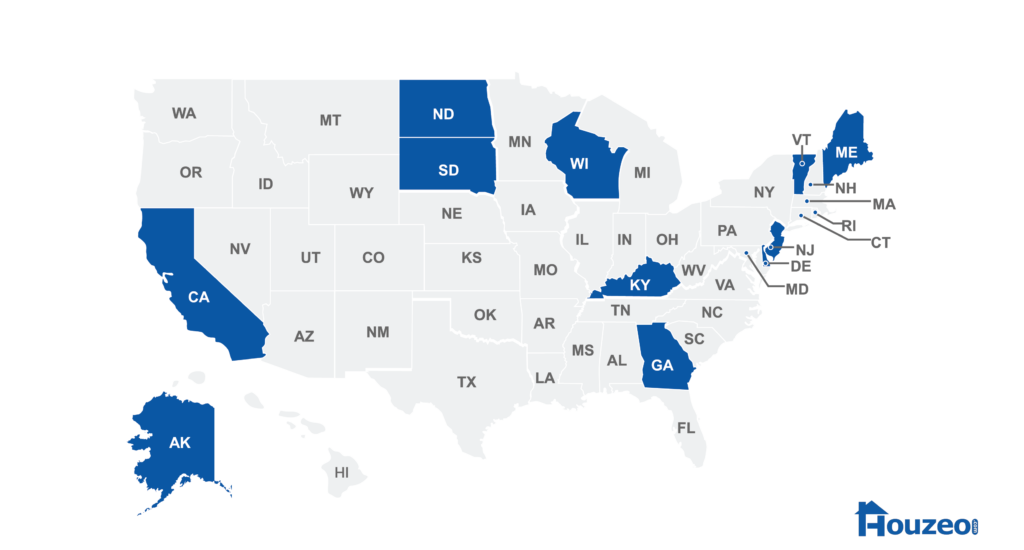No, you don’t have to disclose a death in the home to potential buyers. As per the legalities, you only have to disclose material defects of property in seller disclosure.
If you disclose a death or a crime on your house, you could get difficulty to get a good price or even sell it. Around 30%-40% of buyers are interested in haunted or murder homes. They use such information to negotiate lower prices.
Do you have to disclose a death in a house in case of crimes or murders at home? No, you don’t have to disclose any natural or unnatural death unless mandated by your state regulations.
Do You Have to Disclose an Unnatural Death in Your House?
You do not have to report if someone died in the house due to crime, murder, suicides, etc. except if your state laws necessitate to disclose a death.
If you’re selling a house that is stigmatized with a death or a crime, you had better get equipped with your state laws. You have to disclose a death in a house only in these states:

Do You Have to Disclose a Death That Occurred Before Your Occupancy?
The answer is again a big NO! You only have to disclose those “material defects” to buyers that occurred during your stay. It is unfair or incorrect to expect sellers to disclose anything which they have not witnessed.
What are the State Specific Requirements for Death Disclosure?
Here are the state specific requirements to report a death in your house:
| Requirement of Disclosure | States | Notes |
|---|---|---|
| Must Disclose | Alaska, California, South Dakota | Alaska and South Dakota must report any death in the past one year, while California must disclose any death in the past three years. |
| Disclose, only when asked in written | Delaware, Georgia, Kentucky, Wisconsin | You choose to answer but no action will be taken against you if you do not provide the information. |
| Required if death was due to property conditions | New Jersey | You have to disclose if someone died due to hazardous conditions like toxic molds or lethal gas. |
| Required, only if it affects the home value | Vermont | You should consider the effects of a death on future use or resale value of the house. |
| Disclose only with permission from the seller | Maine, North Dakota | This condition is applicable to Realtors or brokers. |
| Not required to disclose at all | Alabama, Arizona, Arkansas, Colorado, Connecticut, Florida, Hawaii, Idaho, Illinois, Indiana, Iowa, Louisiana, Maryland, Massachusetts, Michigan, Minnesota, Missouri, Montana, Nebraska, Nevada, New Hampshire, New Mexico, New York, North Carolina, Oklahoma, Oregon, Pennsylvania, Rhode Island, South Carolina, Tennessee, Texas, Utah, Virginia, Washington, Washington, D.C., West Virginia |
How Disclosure of a Death in a House Impacts Its Sale and Price
The disclosure of a tragic death taints a home’s overall image and affects its value by more than 25%. The house may also take 50% longer to sell than comparable sales.
On the flip side, stigmatized homes can be traded quickly but for a reduced price. Buyers can leverage the information of a death or a crime to negotiate a reduced price.
What If Buyers Know about a Death in Your Home?
Chances are that a buyer may learn about the fact if someone died in the house through their agents or your neighbors. But there is no legal obligation on you or your real estate agent to speak about it unless questioned.
Impact on sale:
- If you have tried to hide a death on the property and buyers learn it from other sources, this can cause them to mistrust you. They may pull out from the contract and escrow.
- Buyers may still want to buy your house but they will have an upper hand in negotiation.
What If My Home Is Stigmatized?
If you discover a murder or serious crime on your property, you have the option to alter the home’s appearance. Remove all the old stuff connected to the crime scene. Seal off the specific area where a death occurred, specially in case of a suicide.
Similarly, if you feel unusual sensations, like cold spots or shadows, install a new window or lighten it up for warmth. This will make the atmosphere inviting.
You can also seek professional help to transform your home’s image for good. Once a Californian couple purchased a home back in 2010 which was owned by notorious serial killer ‘Dorothea Puente’. Dorothea used to poison the victims and bury them. Eventually, seven bodies were unearthed from the lawn.
The couple renovated the home with a new turf, and a gazebo, and turned the whole yard into a playground.
How to Know if Someone Died in the House?
You can learn about a death in your house with the help of ‘Died In House’. It’s a web-based service which gives an investigation report of any valid US address.
If you’re suspicious about a property’s stigma before buying, you can get a report for a fixed fee. It relieves you of a probable fear about the house.
The Bottom Line
If the death is natural and not going to put a stigma on the home, you’re good to go. You just have to follow state specific requirements to disclose a death.
Except in the states where you have to legally disclose a death in the house, you can refrain from sharing it.
FAQs
If the buyer knows about a death in a house, does the seller have to tell it?
If both the buyer and seller know about the death, then the seller should also be vocal about it.
If the buyer gets suspicious about a death it may adversely impact the sale.
What states require you to disclose a death in a house?
Only three states' laws (Alaska, California, and South Dakota) prescribe legal bindings to disclose a death in a house. Other states either have very lenient laws or no laws at all for the sellers to disclose a death.
Do Realtors and real estate agents have to disclose a death in a house?
A listing agent or a seller's agent doesn’t have to report to the buyer if someone died in the house. They have to inform only about the material defects such as a damaged roof or a probable flood damage.
Maine and North Dakota are two states where Realtors can disclose a death only with permission from the seller. In remaining states there are either legal conditions or no conditions to fulfill at all.










.webp)
